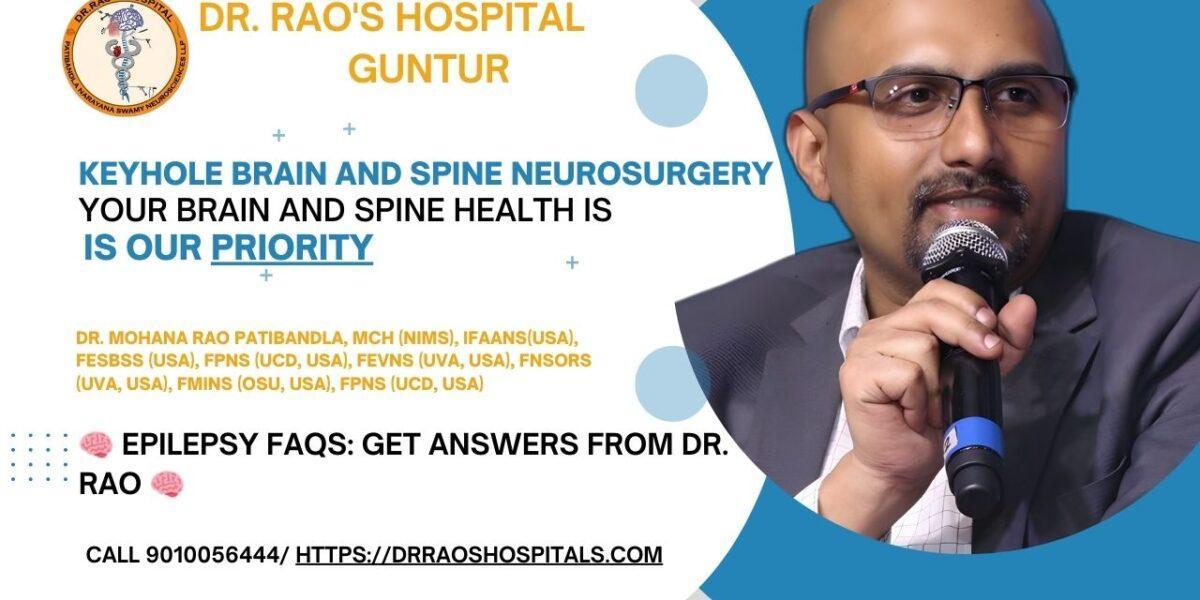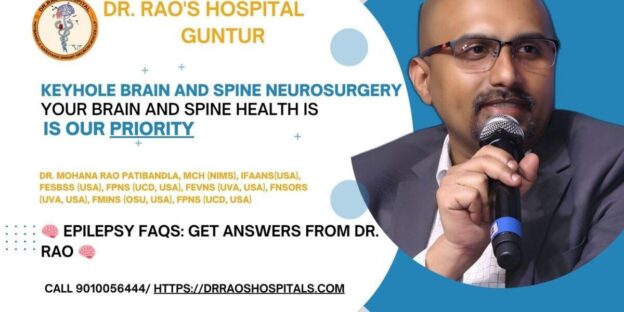Summary: In this enlightening video, Dr. Rao sheds light on epilepsy, providing comprehensive answers to frequently asked questions. From seizure types to treatment options, you’ll find valuable information to help you or your loved ones navigate life with epilepsy.
FAQ of Epilepsy by the Best Epilepsy Surgeon, Dr. Rao
- What is epilepsy?
- What are the causes of epilepsy?
- In about half of the people who have epilepsy, there is no known cause. The condition in the other half can be due to various factors, such as genetic factors, brain damage, infections, tumors, stroke, or metabolic disorders.
- How is epilepsy diagnosed?
- Epilepsy is diagnosed based on medical history, physical examination, and neurological tests. The most common test for epilepsy is an electroencephalogram (EEG), which records the brain’s electrical activity. Other tests may include blood tests, MRI, CT, or PET scans.
- How is epilepsy treated?
- Epilepsy can be treated with medication, surgery, or a combination. Medication is the most common treatment for epilepsy and works by changing the levels of brain chemicals that can help prevent seizures. Surgery can remove the part of the brain causing the seizures and is a cure for temporal lobe epilepsy in 80%. Surgery is not a cure for epilepsy in some cases, but it can effectively reduce seizure frequency.
- Who is Dr. Rao, and why should I consult him for epilepsy treatment?
- Dr. Rao is a world-renowned neurosurgeon who specializes in the treatment of epilepsy. He is the founder and director of Dr. Rao’s Hospital, which is one of the leading epilepsy treatment centers in India. Dr. Rao has extensive experience in the treatment of epilepsy, and he has helped thousands of people to live seizure-free lives. He is a pioneer in using minimally invasive surgery for epilepsy and one of the world’s most respected neurosurgeons. If you are living with epilepsy, I encourage you to consult Dr. Rao. He can help you develop a personalized treatment plan to help you achieve seizure freedom.
- What triggers a seizure?
- Various factors, such as stress, lack of sleep, alcohol, caffeine, drugs, medications, hormonal changes, flashing lights, or fever, can trigger a seizure. However, not everyone with epilepsy has the same triggers; some people may not have any identifiable triggers.
- How do I know if I have had a seizure?
- Sometimes it can be hard to tell if you have had a seizure, especially if you have no memory of it or no witnesses. Some signs that may indicate a seizure are: confusion, headache, fatigue, sore muscles, bitten tongue, bruises, or loss of bladder or bowel control.
- What is the difference between a seizure and a convulsion?
- A seizure is a general term for a sudden change in brain activity that can cause various symptoms. A convulsion is a specific type of seizure that involves involuntary muscle contractions and jerking movements of the body.
- Can epilepsy be cured?
- There is no cure for epilepsy, but it can be controlled with treatment. About 70% of people with epilepsy can achieve seizure freedom with medication. Some people may also benefit from surgery, diet therapy, or devices stimulating the brain or nerves.
- What are the risks of having epilepsy?
- Epilepsy can affect a person’s quality of life in various ways. Some of the risks of having epilepsy are injury from falls or burns during a seizure, status epilepticus (a prolonged or repeated seizure that can be life-threatening), sudden unexpected death in epilepsy (SUDEP), depression, anxiety, memory problems, learning difficulties, social isolation, stigma, and discrimination.
- How can I help someone who is having a seizure?
- The first thing to do is to stay calm and check the person’s safety. If someone has a convulsive seizure, gently roll them onto their side and cushion their head. Do not restrain them or put anything in their mouth. Time the seizure and call for emergency help if it lasts longer than five minutes or if the person has trouble breathing. If the person has a non-convulsive seizure, such as staring or confusion, stay with them and guide them away from danger. Reassure them and help them recover after the seizure.
- Can I live an everyday life with epilepsy?
- Yes, you can live an everyday life with epilepsy. Many people with epilepsy can work, study, drive, travel, and have relationships. However, you may need to adjust your lifestyle to manage your condition and reduce your risk of seizures. For example, you may need to take medication regularly, avoid specific triggers, follow a healthy diet and sleep routine, wear a medical alert bracelet, and inform your family, friends, and colleagues about your epilepsy.
- How does epilepsy affect pregnancy?
- Epilepsy can pose some challenges for pregnancy, but most women with epilepsy can have healthy pregnancies and babies. However, some risks are involved, such as an increased chance of seizures due to hormonal changes or medication changes, increased chance of birth defects due to some anti-seizure medications, and increased chance of complications during labor and delivery due to seizures or medication effects. Therefore, it is essential to plan your pregnancy carefully with your neurologist and obstetrician and follow their advice on medication use and prenatal care.
- What is the ketogenic diet, and how does it help epilepsy?
- The ketogenic diet is a high-fat, low-carbohydrate diet that changes how the body uses energy. It mimics the effects of fasting by forcing the body to burn fat instead of glucose for fuel. This produces ketones in the blood that can help reduce seizures in some people with epilepsy. The ketogenic diet is usually prescribed for children with drug-resistant epilepsy who do not qualify for surgery. It requires close supervision by a dietitian and a neurologist and regular blood tests to monitor its effects.
- What are some new treatments or research for epilepsy?
- There are many new treatments or research for epilepsy that aim to improve diagnosis, treatment options, and quality of life for people with epilepsy. Some examples are: gene therapy that targets specific mutations that cause epilepsy; stem cell therapy that replaces damaged brain cells with healthy ones; optogenetics that uses light to control brain activity; wearable devices that detect seizures and alert caregivers; artificial intelligence that analyzes EEG data and predicts seizures; brain-computer interfaces that allow communication between the brain and external devices; and cannabis-based products that contain compounds that may have anti-seizure effects.
- What is the best epilepsy surgery center in Guntur and Andhra Pradesh?
- According to the web search results, the best epilepsy surgery center in Guntur and Andhra Pradesh is Dr. Rao’s Hospital, one of the region’s best neurology hospitals. They offer comprehensive epilepsy care and advanced treatments for epilepsy, such as neurosurgical epilepsy surgery, vagus nerve stimulation, and a ketogenic diet. They have a team of experienced neurosurgeons and interventional neuro specialists, led by Dr. Mohana Rao Patibandla, considered the best neurosurgeon in Andhra Pradesh. They also have FDA-approved critical care equipment and neuro ICUs to provide complete patient care and safety. If you are looking for the best epilepsy surgery center in Guntur and Andhra Pradesh, you might consider Dr. Rao’s hospital as a possible option. They have a high success rate and patient satisfaction. You can contact them at 090100 56444 or visit their website at drraoshospitals for more information. ????


